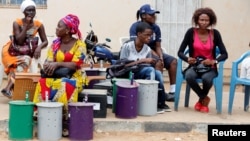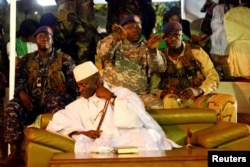Gambians are voting Thursday in a presidential election where incumbent Yahya Jammeh, in power since 1994 and criticized for widespread human rights abuses, is running for a fifth consecutive term.
About 880,000 Gambians will be eligible to vote when more than 1,400 polling stations open. The winner will serve a five-year term in Gambia, a tiny former British colony in West Africa that occupies a narrow sliver of land surrounded by French-speaking Senegal.
Two candidates, Adama Barrow, the candidate for a coalition of seven opposition political parties, and Mamma Kandeh, of the Gambia Democratic Congress party (GDC), are challenging Jammeh.
No communication
Gambians outside of the country, in the diaspora, say the government has imposed a communication blackout, including all social media platforms, and they say they are unable to contact their respective candidates and polling agents.
“People are trying, even from Senegal, to try and communicate with their loved ones inside the Gambia to see what is happening, which has proved futile,” said Saihou Mballow, one of the diaspora coordinators for the GDC.
Charges of rigged election
Some diaspora Gambians are also accusing Jammeh of stealing the election before it is held.
“The election has already been rigged by the incumbent President Jammeh. I can clearly and confidently tell you that communication international lines have been interrupted; internet has been interrupted. It is very difficult for the opposition here to communicate with their polling agents countrywide to know what is happening,” Mballow said, calling the vote a sham.
“The European Union was denied of coming into the country to observe the election. Likewise, the ECOWAS (Economic Community of West African States) are not coming to observe the election. It’s only local observers who are totally under intimidation and supervision of the government. So therefore the election is not free and it is not fair,” Mballow said.
Jammeh has denied accusations of rigging the election. He has said his victory is all but assured with divine intervention and has warned the opposition against protesting.
“Our election system is fraud-proof, rig-proof, you cannot rig our elections,” he said.
No post-election protests
Jammeh has warned that even peaceful protests will not be permitted after Thursday’s election, a move that comes as people are for the first time speaking out more freely against Jammeh’s rule.
“There is no reason that anybody should demonstrate,” Jammeh said, adding that demonstrations will not be allowed “because those are the loopholes that are used to destabilize African governments.”
Candidate Kandeh, who used to be a member of parliament from the ruling APRC party refused to join the coalition of seven political parties.
Diaspora coordinator Mballow denies that Jammeh is using Kandeh to create a semblance of a multiparty election and that Kandeh was trying to get the president re-elected.
“What happened was that at the time of the formation of this coalition, they were in negotiations and at the end of the negotiations, they couldn’t agree on how to select the flag bearer. Most of the parties said that each party should select delegates who would then choose the flag bearer. But the Gambia Democratic Party which I belong to suggested that the flag bearer be chosen after a nationwide primary system and that whoever is selected would have been selected by the Gambian people,” Mballow said.
Jammeh seized power in a 1994 coup and has targeted opponents and several of his own ministers in recent years, while surviving multiple attempts to remove him from power.
The human rights group Amnesty International urged the authorities to ensure that the election and post-electoral period “are held in a climate that is free from violence and which fully respects the right of all people to freely express their views.”

